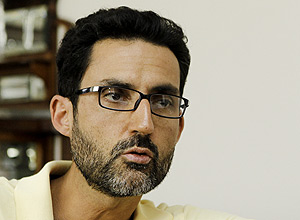Latest Photo Galleries
Brazilian Markets
12h03 Bovespa |
-0,14% | 129.028 |
16h43 Gold |
0,00% | 117 |
12h17 Dollar |
+0,39% | 5,0873 |
16h30 Euro |
+0,49% | 2,65250 |
ADVERTISING
The Brazilian Edward Snowden
08/29/2013 - 09h03
Advertising
PATRÍCIA CAMPOS MELLO
FOLHA COLUMNIST
It is ironic that Eduardo Saboia is likely to become the darling of the Brazilian right and of the opposition, with the support of the presidential candidates Aécio Neves and Eduardo Campos.
There is a Facebook page supporting Saboia on Facebook, on which many have criticized President Rousseff's foreign policy advisor Marco Aurélio Garcia. There are also complaints about the 'communist' or 'third world' foreign policy of the President and her predecessor, Luiz Inácio Lula da Silva.
Saboia used to be of the left. He worked for five years as an advisor to the then Foreign Minister Celso Amorim. He was close to the Brazilian ambassador to Bolivia, Marcel Biato, who was the right-hand-man of Marco Aurélio Garcia. However, Saboia has nothing to do with the Brazilian opposition, nor do his actions constitute any kind of broader criticism of the government's foreign policy.
Rather, his act of dissent is related to a specific set of circumstances, that being the treatment of Roger Pinto and the present relationship between Brazil and Bolivia.
| Alan Marques/Folhapress |
 |
| 'The Senator's political position was never an issue. It was a humanitarian action, his life was in danger,' the diplomat told me the last time we talked. |
'The Senator's political position was never an issue. It was a humanitarian action, his life was in danger,' the diplomat told me the last time we talked. 'This is not meant to be any kind of slight against Brazilian foreign policy,' he said. Saboia voted for President Rousseff in the presidential election of 2010.
Yes, he committed an act of insubordination. It was, however, an act justified for humanitarian reasons. The Senator had not eaten for several days and he was severely depressed, meanwhile the taskforce supposed to negotiate his exit from Bolivia had been dithering, doing little to resolve a stalemate which had already dragged on for 15 months.
The Senator's situation was unacceptable. Evo Morales' government had refused to grant him safe conduct to Brazil - absurd when one considers that even military dictatorships have granted safe conduct. For months, Morales used the jailed fans of the football club Corinthians as a bargaining chip (incidentally, it was Saboia who negotiated their release).
No realpolitik of the Brazilian government with its neighbors and commercial partners of the region could have justified this situation.
Eduardo Saboia is the Brazilian Edward Snowden. He knew exactly what the consequences of his insubordination would be, but he went ahead with it anyway, because it was the right thing to do.
Why was Unasul so swift to condemn the United Kingdom's refusal to grant safe conduct to Julian Assange, the Wikileaks founder still holed up in the Ecuadorian embassy in London?
Why did Mercosur publish a document at July's summit, urging states not 'to impede the implementation' of asylum law 'by any means', referring of course to Edward Snowden?
How is Roger Pinto any different?
He is accused of criminal offences, you might argue. But then so is Assange, who is still subject to a European arrest warrant in relation to a sexual assault investigation. And Snowden, if caught, will also face criminal charges, for leaking classified information.
Moreover, there are nearly 100 Bolivian political exiles in Brazil, all of whom are politicians and their families opposed to the Bolivian government. They have fled Bolivia since Morales was elected. Most of them are facing charges of one sort or another and they argue that the government uses the judiciary as an instrument of political persecution.
The truth is that Pinto opposes Morales, and Brazil does not want to rock the boat with Bolivia. Bolivia, however, has no such scruples when dealing with Brazil. The Bolivian authorities had the Minister of Defence Celso Amorim's plane searched by anti-narcotics police in 2011; it expropriated oil refineries held by Petrobras in Bolivia in 2006, etc, etc. The list goes on.
Translated by TOM GATEHOUSE



